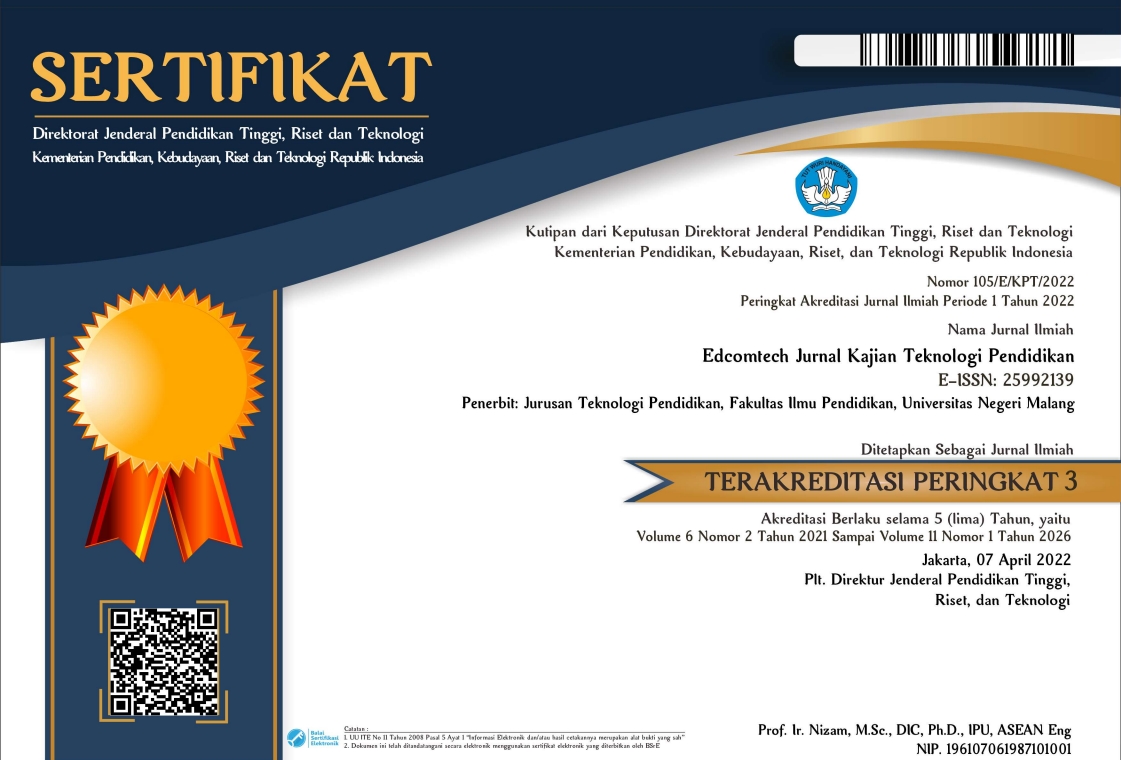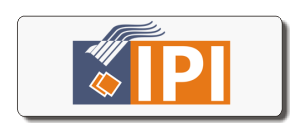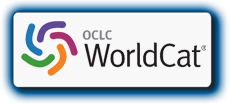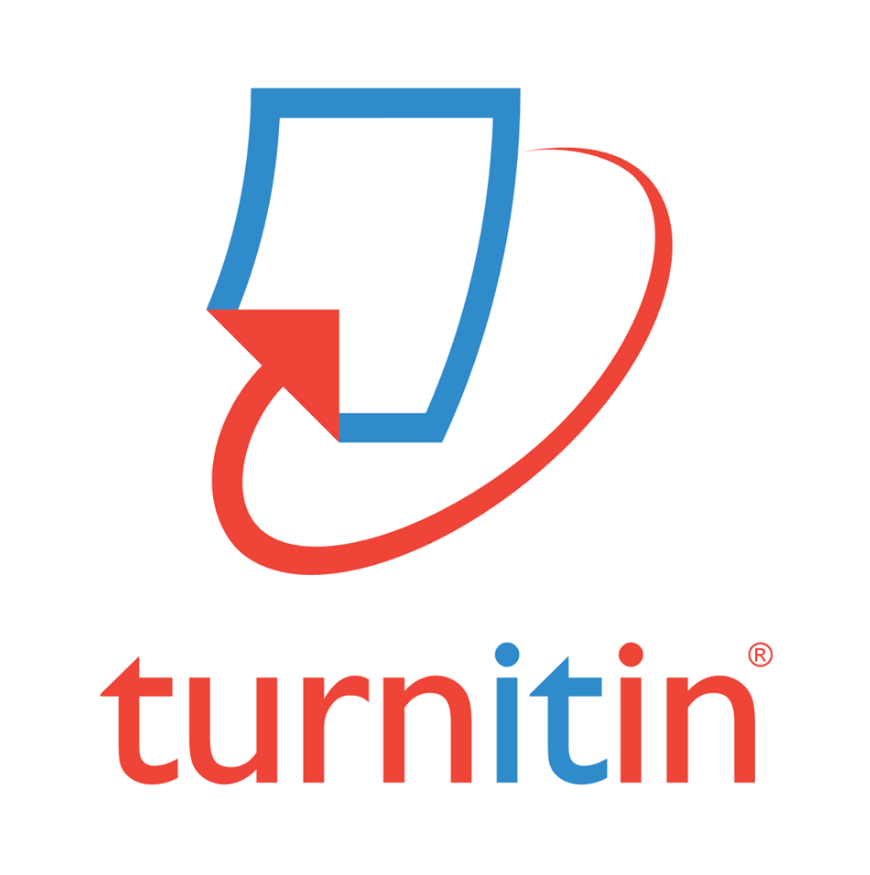The Effect of ICT-Based Learning on Students' Learning Achievement of Computer System in Vocational High School
Abstract
This study aimed to examine the effect of ICT-based learning on learning achievement of computer system. This study was a quantitative research with quasy-experimental method and post-test only control group design model. The subject was tenth graders of a vocational high school on Multi Media and Computer Engineering and Network skill competencies as many as 90 students which was divided into two equal groups that taught using ICT-based learning and conventional method. The instrument of the study was a written test (post-test) to measure the learning achievement. The data was analyzed by independent-samples T Test at 0.05 significance level. The finding revealed that coefficient t-test (10.025) > ttable (1.987) with p-value (2-tailed) 0.000, so there was a significant difference on computer system’s learning achievement between groups that taught using ICT-based learning and conventional methods. Thus, ICT-based learning has a significant effect on the students’ learning achievement of computer system.
Keywords: ICT-based learning; conventional method; learning achievement
Full Text:
PDFReferences
Destiana, B., & Soenarto. (2014). Faktor Determinan Pemanfaatan TIK dan Pengaruhnya Terhadap Kinerja Guru SMK di Kabupaten
GunungKidul. Jurnal Pendidikan Vokasi, 4(3), 285-299. Retrieved from https://journal.uny.ac.id/index.php/jpv/article/view/2555/2109
Ghavifekr, S., & Rosdy, W. A. W. (2015). Teaching and Learning with Technology: Effectiveness of ICT Integration in Schools.
International Journal of Research in Education and Science, 1(2), 175-191.
Retrieved from https://www.ijres.net/index.php/ijres/article/
view/79/43
Halidi, H. M., Husain, S. N., & Saehana, S. (2015). Pengaruh Media Pembelajaran Berbasis TIK terhadap Motivasi dan Hasil Belajar
IPA Siswa Kelas V SDN Model Terpadu Madani Palu.
Jurnal Mitra Sains, 3(1), 053-060.
Retrieved From http://jurnal.untad.ac.id/jurnal/index.php/MitraSains/
article/view/4153/3090
Hussain, Z. (2018). The Effects of ICT-Based Learning on
Students’ Vocabulary Mastery in Junior High Schools in Bandung. International Journal of Education, 10(2), 149-156. Retrieved from http://ejournal.upi.edu/index.php/ije/article/view/7592/pdf_1
Huurun’ien, K. I., Efendi, A., & Tamrin, A. G. (2017). Efektivitas menggunakan E-Learning Berbasis Schoology dengan Menggunakan
Model Discovery Learning Terhadap Prestasi Belajar Siswa Pada Mata Pelajaran Sistem Komputer Kelas X Multimedia SMK Negeri 6
Surakarta pada Tahun Pelajaran 2015/2016. Jurnal Ilmiah Pendidikan Teknik Kejuruan, X(2), 036-046.
Retrieved From https://Jurnal.Uns.Ac.Id/Jptk/Article/View/16866
Karatza, Z. (2019). Information and Communication Technology (ICT) as a Tool of Differentiated Instruction: An Informative Intervention
and a Comparative Study on Educators’ Views and Extent of ICT Use. International Journal of Information and Education Technology,
(1), 08-15. Retrieved from http://www.ijiet.org/vol9/1165-EM0011.pdf
Mikre, F. (2011). The Roles of Information Communication Technologies in Education Review Article with Emphasis to the Computer
and Internet. Ethiopian Journal of Education and Sciences,
(2), 109-126. Retrieved from https://www.ajol.info/index.php/ejesc/article/view/73521
Muslih. (2016). Pemanfaatan Media Pembelajaran Berbasis ICT pada Lembaga Pendidikan Non-Formal TPQ. DIMAS: Jurnal Pemikiran Agama untuk Pemberdayaan, 6(2), 215-234.Retrieved fromhttp://dx.doi.org/10.21580/dms.2016.162.1090
Nur, M. D. (2017). Pengaruh Strategi Pembelajaran Fisika Berbasis Website Terhadap Hasil Belajar pada Siswa yang Memiliki
Self-Regulated Learning (SRL) yang Berbeda. Edcomtech: Jurnal Kajian Teknologi Pendidikan, 2(1), 065-076. Retrieved from http://journal2.um.ac.id/index.php/edcomtech/article/view/2078/1223
Nurchaili. (2010). Pengaruh Media Pembelajaran Berbasis Teknologi Informasi dalam Proses Pembelajaran Kimia Terhadap Peningkatan
Hasil Belajar Siswa. Jurnal Pendidikan dan Kebudayaan, 16(6), 648-658. Retrieved from http://jurnaldikbud.kemdikbud.go.id/index.php/jpnk/article/viewFile/
/335
Nurvitasari, E., & Asmaningrum, H. P. (2018). Pemanfaatan Teknologi Informasi dan Komunikasi oleh Guru dalam Pembelajaran Kimia
SMA di Distrik Merauke. Jurnal Magistra Volume 5 – Nomor 1,
Januari 2018, 48-61. Retrieved from http://ejournal.unmus.ac.id/index.php/magistra/article/view/722/579
Pradana, D. A, Sihkabuden., & Husna, A. (2016). E-Module Mata Pelajaran Kewarganegaraan Untuk Meningkatkan Hasil Belajar
Siswa. Edcomtech: Jurnal Kajian Teknologi Pendidikan, 1(2), 143-146. Retrieved from http://journal2.um.ac.id/index.php/edcomtech/article/view/
/1041
Samiasih, R., Sulton., & Praherdhiono, H. (2017). Pengembangan E-Module Mata Pelajaran IPA Pokok Bahasan Interaksi Makhluk Hidup
Dengan Lingkungannya. Edcomtech: Jurnal Kajian Teknologi Pendidikan, 2(2), 119-124. Retrieved from http://journal2.um.ac.id/index.php/edcomtech/article/view/2082/1227
Sarkar, S. (2012). The Role of Information and Communication Technology (ICT) in Higher Education for the 21st Century.
The Science Probe, 1(1), 030-040. Retrieved from http://citeseerx.ist.psu.edu/viewdoc/download?doi=10.1.1.463.2380&rep=rep1&type=pdf
Solihatin, E. (2017). Pengaruh Pembelajaran Berbasis Internet dan Konsep Diri Terhadap Hasil Peer Teaching. Jurnal Teknologi Pendidikan 19(1), 012-022. Retrieved from http://journal.unj.ac.id/unj/index.php/jtp/article/view/5331/4316
Sugiyono. (2016). Metode Penelitian Kuantitatif, Kualitatif, dan R&D. Bandung: Alfabeta.
Surjono, H. D. (2013). Peranan Teknologi Informasi dan Komunikasi (ICT) dalam Peningkatan Proses Pembelajaran yang Inovatif.
Makalah Seminar Nasional Pendidikan & Saintec disampaikan di
Universitas Muhammadiyah Surakarta, 01-10. Retrieved from
http://staffnew.uny.ac.id/upload/131666733/penelitian/peranan-tik-dalam-pembelajaran-inovatif.pdf
Zwart, D. P., Van Luit, J. E. H., Noroozi, O., & Goei, S. L. (2017). The Effects of Digital Learning Material on Students Mathematics
Learning in Vocational Education. Cogent Education, 4(1) 1313581, 01-10. Retrieved from https://research.vu.nl/ws/portalfiles/portal/39279964/
Zwart_Van_Luit_Noroozi_Goei_2017_The_effects_of_digital_learning_
material_on_students_mathematics_learning_in_vocational_education_
Cogent.pdf
DOI: http://dx.doi.org/10.17977/um039v4i12019p027
Refbacks
- There are currently no refbacks.
Copyright (c) 2019 Made Agustia Permata Wardani, Rufi'i Rufi'i, Harwanto Harwanto

This work is licensed under a Creative Commons Attribution-ShareAlike 4.0 International License.
Edcomtech: Jurnal Kajian Teknologi Pendidikan published by Department of Educational Technology, Faculty of Education, State University of Malang in Collaboration with Asosiasi Program Studi Teknologi Pendidikan Indonesia (APS TPI) and Ikatan Profesi Teknologi Pendidikan Indonesia (IPTPI) with MoU.
Publisher Address:
Lab. Teknologi Pendidikan, Gd.E2, Lt.1
Fakultas Ilmu Pendidikan Universitas Negeri Malang
Jalan Semarang No 5, Kota Malang Kode Pos 65145
Email: edcomtech.fip@um.ac.id
========================================================================================================
| INDEXED BY | TOOLS | PLAGIARISM CHECK | ARTICLE TEMPLATE |
|

Edcomtech is licensed under a Creative Commons Attribution-ShareAlike 4.0 International License.
Edcomtech Statistics (Since July 13th, 2020)











1.png)








